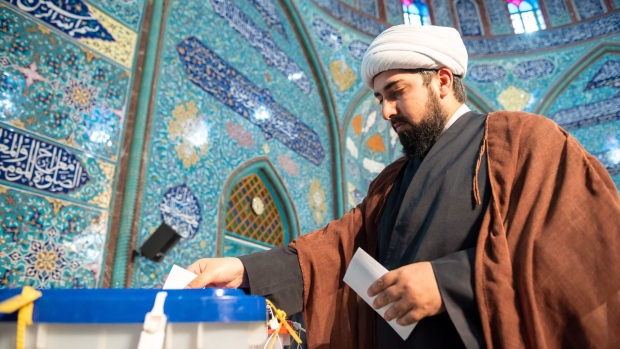Mar 2, 2024
Iran’s Parliamentary Election Turnout Slumps to Historic Low
, Bloomberg News

(Bloomberg) -- Iran’s parliamentary elections saw a decline in voter participation to historic lows, according to estimates published by state-run media, in a vote hailed by authorities as a triumph for the ruling establishment regardless of its outcome.
Some 25 million Iranians, or 41% of eligible voters, went to the polls on Friday, the official Islamic Republic News Agency reported. Vote counting was underway on Saturday evening and the final results were expected to be published later or on Sunday by the interior ministry.
The turnout marked a new low point for parliamentary ballot in the Islamic Republic. It was slightly below the 2020 election, where some 42% of eligible voters cast ballots. In the capital Tehran, turnout was estimated at just 24%, the semi-official Mehr news agency reported, without citing where it obtained the information.
The results affirmed expectations that the next Iranian parliament was shaping up to align closely with the hard-line government of President Ebrahim Raisi, who said without offering evidence that the vote foiled an enemy plot to discourage participation. Iran’s state-run television aired reports of an “epic” turnout at the polls.
“Make our friends happy and ill-wishers disappointed,” Supreme Leader Ali Khamenei said Friday, concluding weeks-long appeal for people to participate in elections.
Read more: Iran’s Leaders Seek to Send Signal to US With Election Turnout
The low turnout reflects a growing sense of apathy for political engagement in the Middle East nation, as many Iranians equate participating in elections with giving a vote of confidence to a government they blame for economic grievances, worsening living conditions, and crackdowns on anti-regime protests.
In a bid to boost participation, officials relaxed voting requirements, enabling the citizens for the first time to use their national ID cards at the polls instead of traditional identity booklets.
The elections also included a vote on the Assembly of Experts. The body, comprised of 88 Islamic jurists elected every eight years, has the authority to select and remove the supreme leader.
Raisi was re-elected to the assembly from the South Khorasan province, while his moderate predecessor, Hassan Rouhani, was barred from seeking re-election to the influential body after serving as a member for more than two decades. Separately, semi-official media reported that former reformist president, Mohammad Khatami, was among scores of political figures boycotting the elections.
(Corrects the name of the province in the final paragraph in a story published on March 2.)
©2024 Bloomberg L.P.








